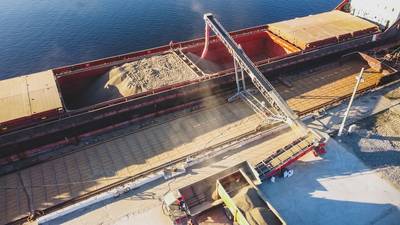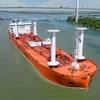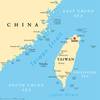Ukraine, Russia Sign Deal to Reopen Grain Export Ports
Russia and Ukraine signed a landmark deal on Friday to reopen Ukrainian Black Sea ports for grain exports, raising hopes that an international food crisis aggravated by the Russian invasion can be eased.
The accord crowned two months of talks brokered by the United Nations and Turkey, a NATO member that has good relations with both Russia and Ukraine and controls the straits leading into the Black Sea.
Speaking at the signing ceremony in Istanbul, U.N. Secretary General Antonio Guterres said the deal opens the way to significant volumes of commercial food exports from three key Ukrainian ports – Odesa, Chernomorsk and Yuzhny.
"Today, there is a beacon on the Black Sea. A beacon of hope..., possibility...and relief in a world that needs it more than ever," Guterres told the gathering.
But fighting raged on unabated in Ukraine's east and, underlining the enmity and mistrust driving the worst conflict in Europe since World War Two, Russian and Ukrainian representatives declined to sit at the same table and avoided shaking hands at the ceremony.
Ukrainian President Volodymyr Zelenskiy doused hopes that the accord might nudge the conflict nearer a resolution, signalling in an interview with the Wall Street Journal that Kyiv had little appetite for an early ceasefire.
A blockade of Ukrainian ports by Russia's Black Sea fleet, trapping tens of millions of tonnes of grain in silos and stranding many ships, has worsened global supply chain bottlenecks and, along with sweeping Western sanctions, stoked galloping inflation in food and energy prices around the world.
Moscow has denied responsibility for the worsening food crisis, blaming instead sanctions for slowing its own food and fertilizer exports and Ukraine for mining the approaches to its Black Sea ports.
A U.N. official said a separate pact signed on Friday would smooth such Russian exports and that the United Nations welcomed U.S. and European Union clarifications that their sanctions would not apply to their shipment.
Addressing Western concerns that reopening shipping lanes could leave Ukraine open to attack, Russian Defence Minister Sergei Shoigu said Moscow would not seek to take advantage of the de-mining of Ukraine's ports.
"Russia has taken on the obligations that are clearly spelled out in this document. We will not take advantage of the fact that the ports will be cleared and opened," Shoigu said on the Rossiya-24 state TV channel.
Ukraine's infrastructure minister Oleksandr Kubrakov also said that Kyiv does not see a risk of Russian ships attacking through the ports as they would be vulnerable to Ukrainian missile strikes.
Safe passage
Senior U.N. officials, briefing reporters on Friday, said the deal was expected to be fully operational in a few weeks and would restore grain shipments from the three reopened ports to pre-war levels of 5 million tonnes a month.
Safe passage into and out of the ports would be guaranteed in what one official called a "de facto ceasefire" for the ships and facilities covered, they said, although the word "ceasefire" was not in the agreement text.
Though Ukraine has mined nearby offshore areas as part of its defenses against Russia's five-month-old invasion, Ukrainian pilots would guide ships along safe channels in its territorial waters, they said.
Monitored by a Joint Coordination Center based in Istanbul, the ships would then transit the Black Sea to Turkey's Bosphorus strait and proceed to world markets.
The overall objective is to help avert famine among tens of millions of people in poorer nations by injecting more wheat, sunflower oil, fertilizer and other products into world markets including for humanitarian needs, partly at lower prices.
No ceasefire yet, says Zelenskiy
Italian Prime Minister Mario Draghi said he hoped the accord offered an opportunity to resolve the wider conflict.
"We hope that these agreements represent a first step towards concrete prospects for peace, in terms that are acceptable to Ukraine," Draghi said.
However, Ukrainian President Zelenskiy told the Wall Street Journal a pause that allowed Russia to keep Ukrainian territory would only encourage a wider war.
"Freezing the conflict with the Russian Federation means a pause that gives the Russian Federation a break for rest," the newspaper reported Zelenskiy as saying.
"Society believes that all the territories must be liberated first, and then we can negotiate about what to do and how we could live in the centuries ahead," he said.
The United States believes Russia's military is sustaining hundreds of casualties a day, a senior U.S. defense official said. The official said Washington also believed Ukraine had destroyed more than 100 "high-value" Russian targets in Ukraine, including command posts and air-defence sites.
The U.S. Department of Defense is considering whether it can send fighter jets to Ukraine in the future, a White House spokesman told reporters.
There have been no major breakthroughs on front lines since Russian forces seized the last two Ukrainian-held cities in eastern Luhansk province in late June and early July.
Kyiv hopes that its gradually increasing supply of Western arms, such as U.S. High Mobility Artillery Rocket System (HIMARS), will allow it to recapture lost territories.
Russia's defense ministry said on Friday its forces had destroyed four HIMARS systems between July 5-20. Kyiv denied the claims, calling them "fakes" meant to sap Western support for Ukraine. Reuters could not verify the assertions.
Russia says it is waging a "special military operation" to demilitarize its neighbor and rid it of dangerous nationalists.
Kyiv and the West say Russia is mounting an imperialist campaign to reconquer a pro-Western neighbor that broke free of Moscow's rule when the Soviet Union collapsed in 1991.
(Reporting by Reuters bureaux; writing by Mark Heinrich and Toby Chopra; editing by Stephen Coates, Nick Macfie and William Maclean)














